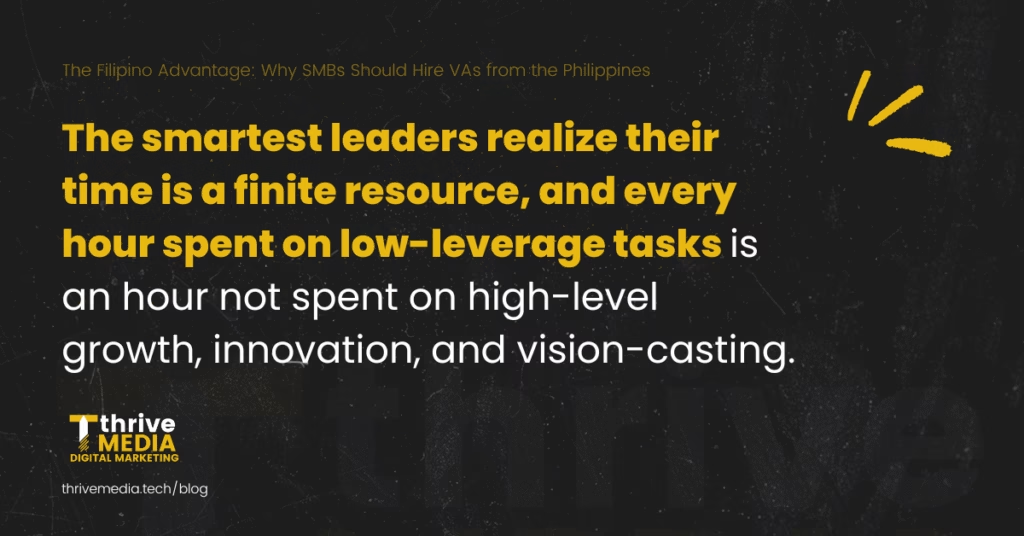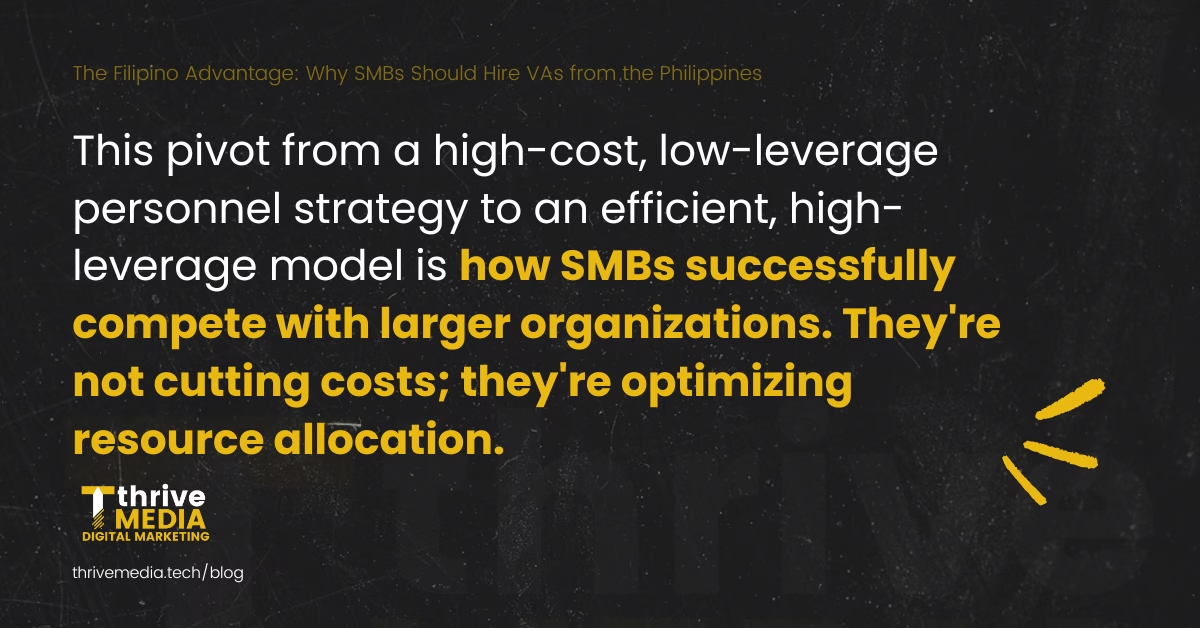Every ambitious Small-to-Medium Business (SMB) owner hits the same wall. It’s the uncomfortable junction where growth potential meets operational bandwidth. You’re drowning in the details: invoices, scheduling, inbox management, and social media posting; and you know these tasks must be handed off. The business can’t scale if the CEO is also the chief administrative officer.
The traditional options are often a false choice.
Option one: Hire an expensive, local employee. This might solve the bandwidth issue, but the overhead: salaries, benefits, office space, specialized training, eats directly into the margin you’re fighting to protect.
Option two: Try to manage the details yourself, slowing down strategic momentum and leading to burnout. This path ensures your company never graduates from its current size.
This dilemma isn’t about laziness; it’s about strategic leverage. The smartest leaders realize their time is a finite resource, and every hour spent on low-leverage tasks is an hour not spent on high-level growth, innovation, and vision-casting.
The constraint is clear: businesses need premium, reliable support that integrates seamlessly without bankrupting the budget or increasing management complexity.
This is the hidden crisis faced by SMBs worldwide: The struggle to secure specialized, dedicated support that allows leadership to operate at its highest level, all while maintaining financial efficiency.

The Hidden Constraint in the Equation
For too long, executives have viewed support staff as a simple cost center, a necessary expenditure to manage daily friction. When support is viewed through this limited lens, the first impulse is always to cut corners, leading to under-qualified hires, outsourced roles that lack accountability, or automated systems that fail to handle complexity. The constraint isn’t just cost; it’s the quality-to-price ratio in the local talent market. Premium, dedicated, and highly communicative support often comes with an exorbitant price tag.
What if the equation could be flipped? What if staffing wasn’t a cost center, but an immediate strategic investment in scalability?
The answer lies in adopting a global perspective, deliberately seeking out talent pools defined by high education standards, a deep commitment to service excellence, and a natural proficiency in Western business methodologies.
This isn’t simply “finding someone cheaper.” This is a strategy for leveraging world-class dedication and skill sets that are abundant and accessible, but often overlooked by firms locked into geographic parochialism.
This is why a specific regional approach is delivering such powerful results for smart companies today. By tapping into established, reliable international talent pools, businesses gain an immediate competitive edge in both operational excellence and profit protection.
Beyond the Cost Center: An Untapped Talent Pool
The global economy has matured past the point where location determines capability. Today, the most valuable assets a company can acquire are discipline, loyalty, and a proactive work ethic.
When executives decide to explore remote operational support, they quickly discover a specific talent market that excels across all these vectors: the Philippines.
For small and medium businesses, this strategic move is less about outsourcing menial tasks and more about finding genuinely dedicated team members who view their role as a career, not a temporary job. The resulting teams are not just effective; they become foundational components of a growing enterprise, bringing a cultural layer of service-first dedication that transforms back-office operations into a significant business asset.
This transformation: turning an administrative headache into a strategic advantage, hinges on three undeniable pillars that define the experience of partnering with highly skilled professionals from this specific market. The experience is not just about reducing wages; it’s about elevating the overall quality and commitment of the administrative and technical team you bring on board.
Pillar I: The Service Mentality
In many Western business environments, finding employees who possess an innate, proactive service mentality can be challenging. The Philippines, however, possesses a culture where service, respect, and meticulous attention to detail are core professional tenets. This is rooted in both cultural values and a long-standing history as a global hub for sophisticated service industries.
The professionals you engage bring an elevated level of professionalism and dedication to every task, large or small. They are trained to anticipate needs, communicate clearly and courteously, and approach problem-solving with remarkable composure. This translates directly to smoother operations for the SMB owner.
When a team member takes ownership of a client’s email inbox, for instance, they don’t just process messages; they manage relationships and ensure seamless communication flow.

The practical advantage here is reduced need for constant oversight. When you delegate a process, be it content creation, calendar management, or financial reconciliation, the expectation is that the work will be executed with precision and without excuses. This level of intrinsic dedication and ownership allows the executive to truly step away from the minutiae, trusting that their operations are in capable, committed hands.
This is the definition of Filipino remote team advantage for SMBs: reliability as a feature, not a hope.
Pillar II: The Global Fluency Quotient
Effective communication is the lifeblood of remote work. Any language barrier immediately undermines efficiency and trust. Professionals from the Philippines are consistently recognized for their high proficiency in English, often demonstrating neutral accents and a deep understanding of Western communication norms and business jargon.
This fluency is a product of their educational system, which heavily emphasizes English proficiency from an early age, coupled with the country’s extensive historical ties to the United States.
However, the “Global Fluency Quotient” extends far beyond mere language skills. This is a workforce highly adaptive to Western business software, platforms, and cultural expectations.
They are digitally literate, accustomed to remote collaboration tools, and capable of integrating rapidly into established workflows, whether they involve specific CRM software, advanced digital marketing platforms, or proprietary internal communication channels.
This adaptability means onboarding time is significantly reduced. The need for lengthy, remedial training on basic business protocols is minimized. The focus immediately shifts to task-specific training, allowing the SMB to gain near-instant productivity. This cultural and technical readiness ensures the remote team member is not an isolated worker, but a fully integrated, functional part of the American, Canadian, or European business framework.
Pillar III: The Strategic Value Proposition
Too often, the discussion around international staffing centers purely on the cost savings, reducing the value proposition to a transactional discount. This misses the strategic point entirely. The true advantage is achieving a higher quality of service and a broader range of skills for a more efficient investment.
Consider the complexity of a modern small business: it needs administrative support, social media coordination, potentially web maintenance, and financial tracking. Hiring individuals for each of these specialized roles in a high-cost market is prohibitive.
The smart strategy is recognizing that, in the most capable international markets, you can often secure one highly capable individual or a specialized small team for the equivalent cost of a single entry-level local hire.
This is the powerful reality of leveraging global economics. When you invest efficiently in a high-performing remote team, the result is not just reduced operating expenditure, but amplified output and a significantly higher return on investment (ROI) on your personnel spend.
This cost-effective scaling solution frees up capital—capital that can then be strategically reinvested into product development, high-level marketing, or sales initiatives.
This pivot from a high-cost, low-leverage personnel strategy to an efficient, high-leverage model is how SMBs successfully compete with larger organizations. They’re not cutting costs; they’re optimizing resource allocation.

From Idea to Implementation
Recognizing the Filipino remote team advantage for SMBs is the first step. The next is navigating the complexity of successful integration. The most successful SMBs do not simply hire an individual; they adopt a proven system for vetting, training, and managing this crucial relationship.
Successful implementation requires more than a job description. It demands a dedicated process that matches the business’s specific cultural needs with the right talent profile, handles the intricacies of remote contracts and payroll, and establishes clear, results-driven workflows from day one. When done correctly, the remote professional becomes an extension of your local team: loyal, dedicated, and indispensable.
The path to scaling your business without sacrificing quality, margin, or sanity is open. It’s a path traveled by thousands of rapidly expanding companies that understood that the right talent pool, one defined by dedication, education, and unparalleled service, is the ultimate growth hack.
The Outcome: What Scaling Truly Looks Like
Imagine your week free from the burden of daily administrative tasks, your inbox managed, your projects tracked, and your digital presence handled with professionalism. This isn’t just about freeing up time; it’s about regaining the mental clarity required for strategic decision-making.
When you partner with a world-class remote operational team, you aren’t just crossing items off a to-do list. You are fundamentally restructuring your business to be resilient, agile, and globally competitive. You are elevating your role from operational manager to strategic visionary. That is what true, sustainable growth looks like.
Get in touch with Thrive Media today to discover your options for scaling and freeing your business.











